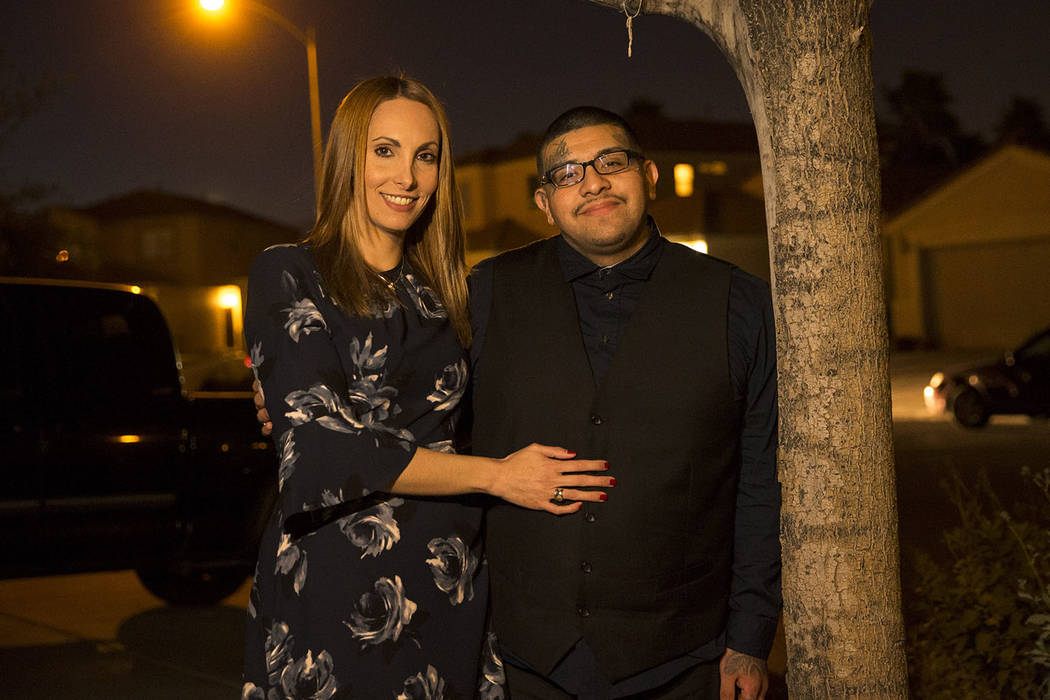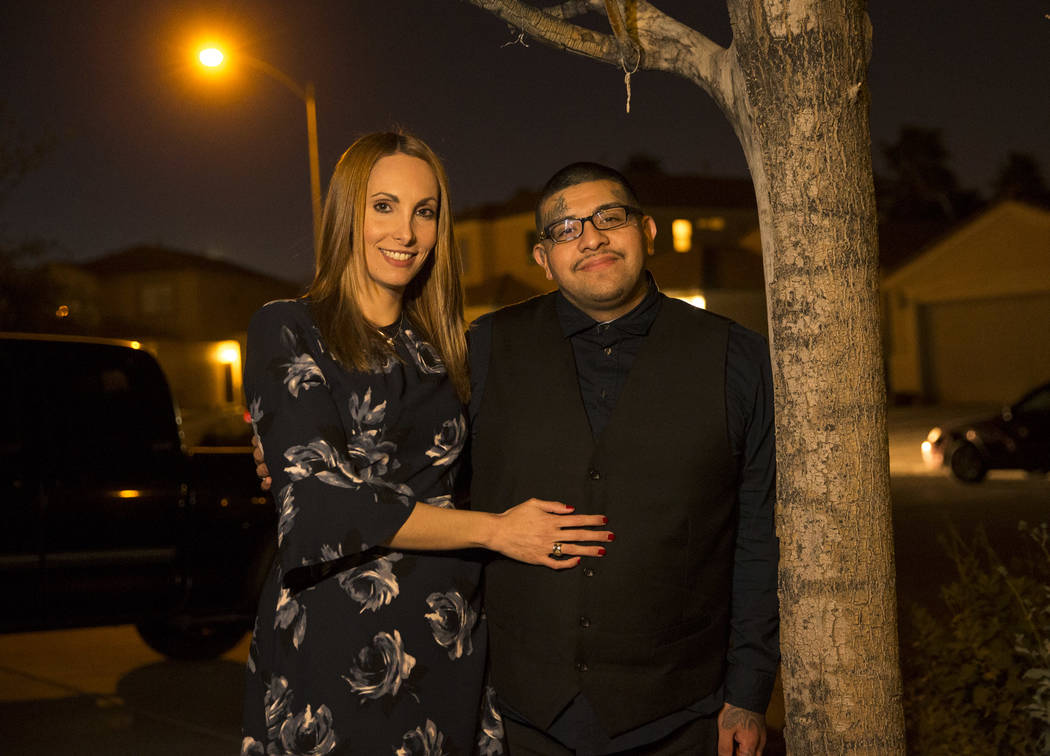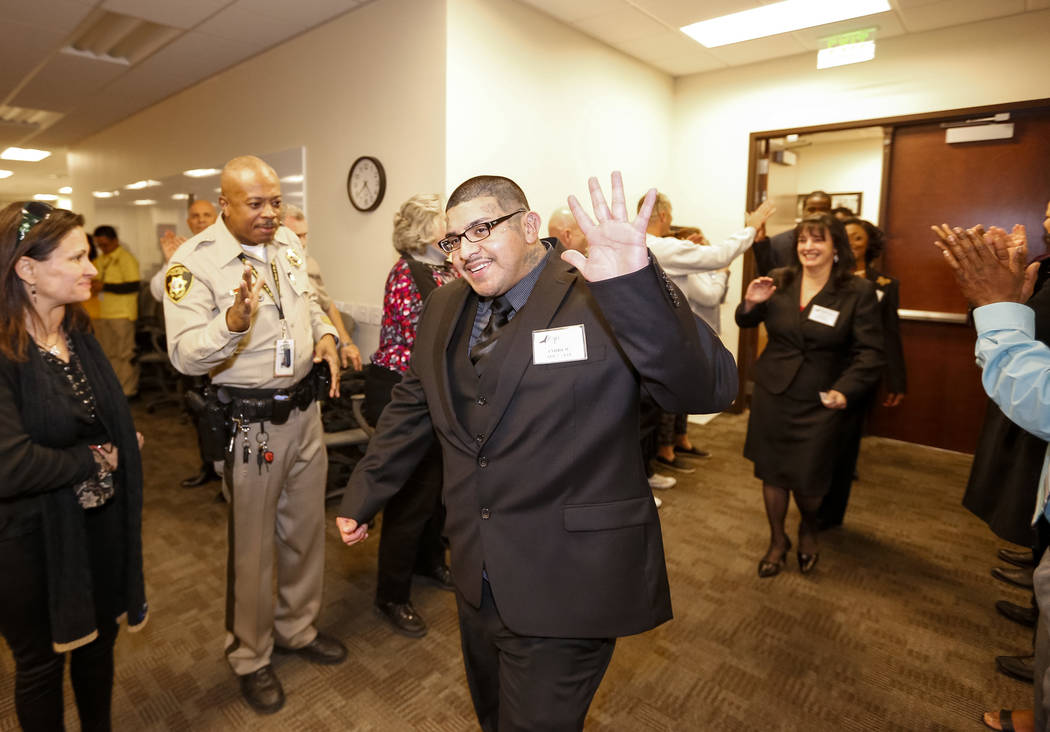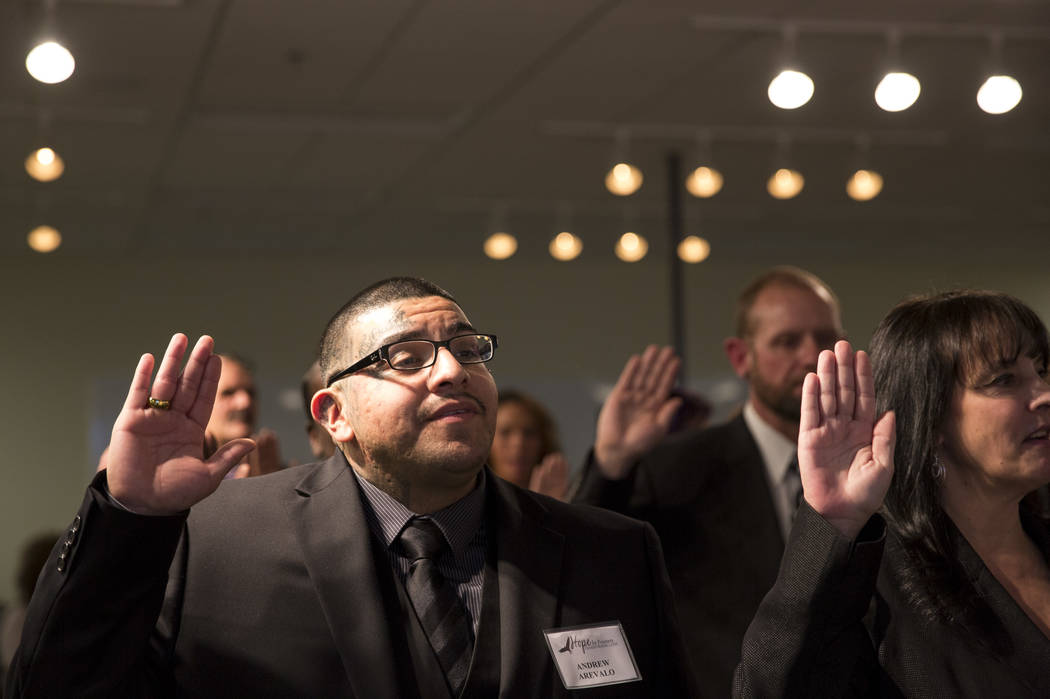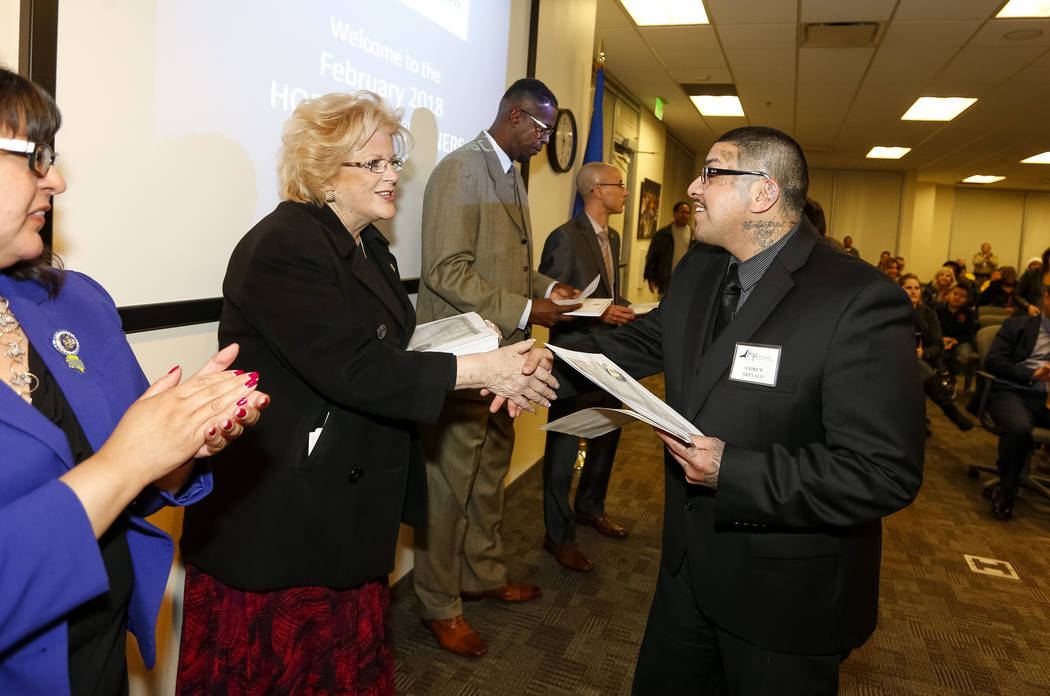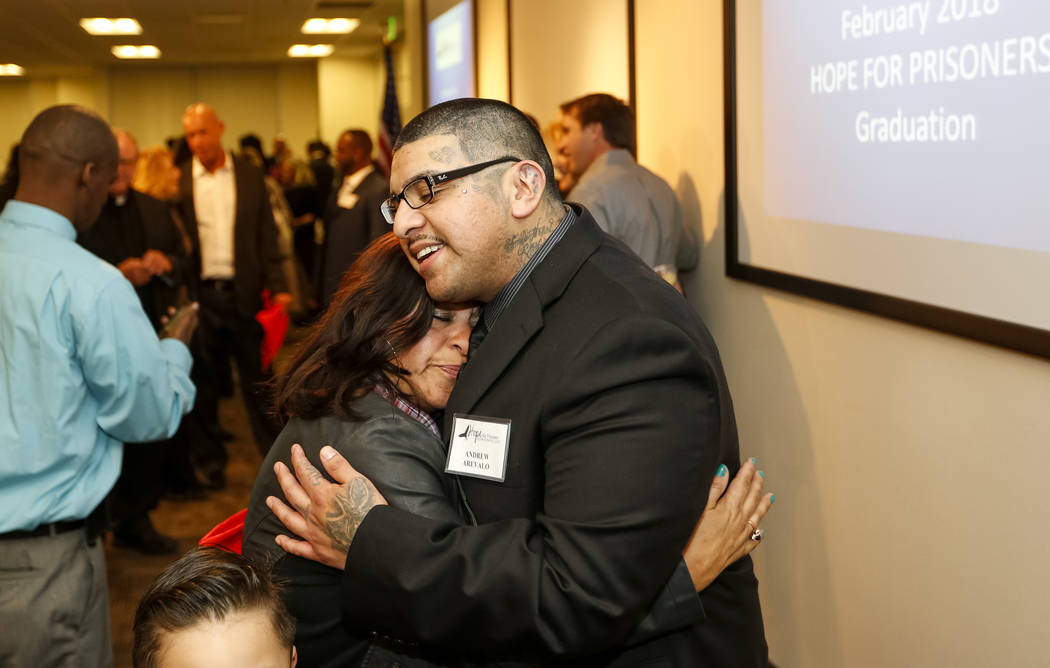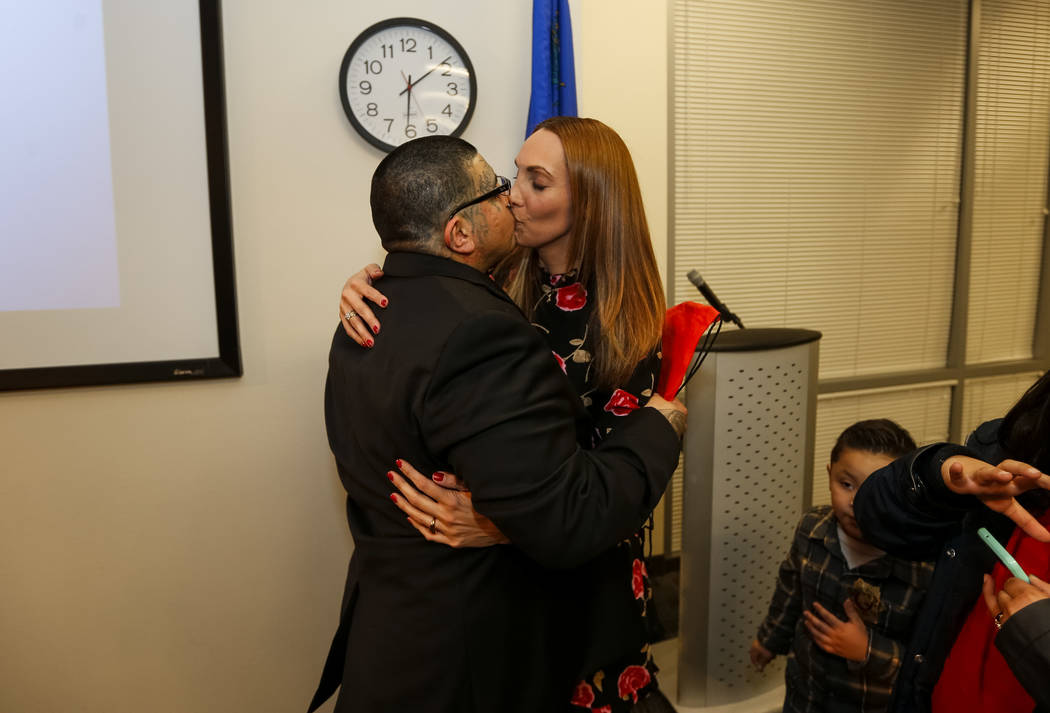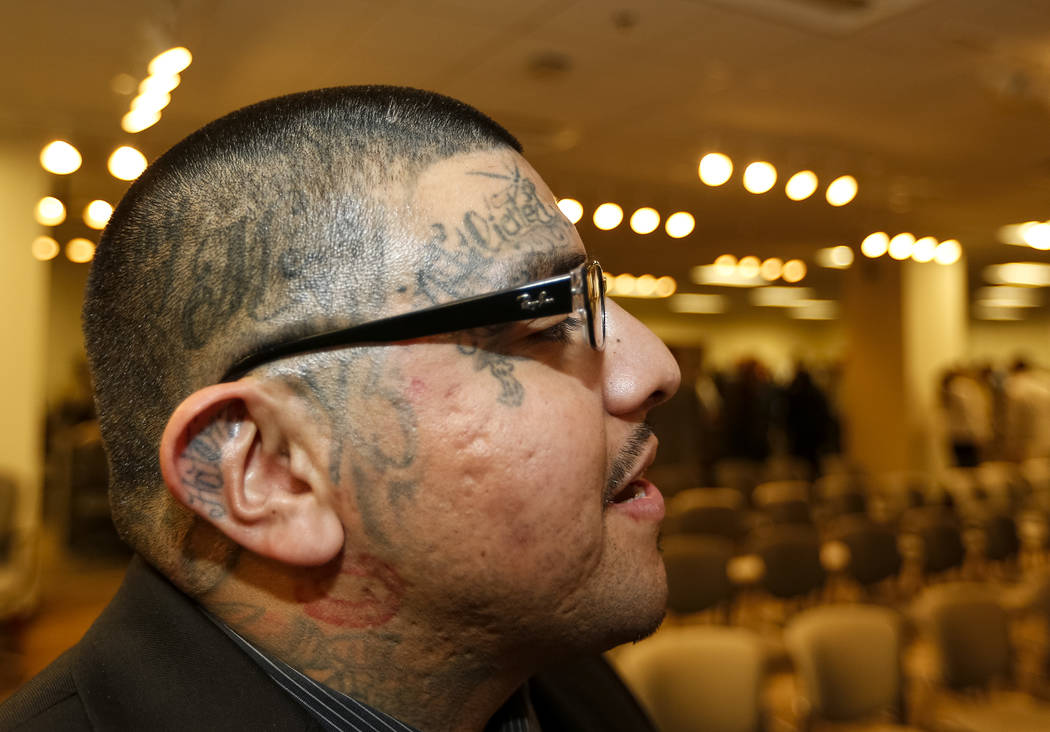Former inmate, boyfriend of Las Vegas attorney, seeks to turn life around
On this day in 2019, Andrew Arevalo sees himself waking up to an alarm at 4:30 a.m., a time he calls “dark thirty.” He goes for his morning workout.
He has completed the paralegal program at UNLV. He goes to Narcotics Anonymous to focus on his recovery. Before heading out the door for work, he tells himself his daily affirmations.
“I’m valued, I am successful, I make useful contributions,” the tattooed man in the dark suit told the crowd of judges, city officials and law enforcement at Metropolitan Police Department headquarters.
Arevalo, 27, was one of the current and former prisoners graduating Friday from Hope for Prisoners, a nonprofit organization that partners with law enforcement agencies across the state to give current and former inmates a chance to return as productive members of society.
But he also made headlines last year for being the incarcerated boyfriend of defense attorney Alexis Plunkett, who was indicted in July on felony charges and accused of improperly providing a cellphone to two jail inmates, including Arevalo. The charges were dismissed in September.
Plunkett represented Arevalo in his lawsuit against the Nevada Department of Corrections and others, including the former director of prisons, after he was shot in the face by a correctional officer in 2014 at Nevada’s High Desert State Prison in a shooting that left another man dead.
Adjusting his glasses Friday, he offered a few final words: “My name is Andrew Arevalo, and this is my vision.”
Since 2009, Hope for Prisoners founder the Rev. Jon Ponder and his team have given nearly 2,000 Nevada inmates skills they can use in returning to society.
Friday’s class was the largest class yet: 41 men and women. They will spend the next 18 months navigating the process of integration and finding employment.
“God wakes me up every morning to do everything I can to blow the doors off the hinges,” said Ponder, who spent years in federal prison himself. “You can see the eagerness in their face.”
Unlikely match
It was in a Las Vegas courtroom in 2012 when Arevalo met Plunkett. She had a briefcase; he was in custody on burglary charges.
He asked her for her business card, and they developed a relationship that flourished over the years.
He was attracted to her beauty: her straight, golden-brown hair, brown eyes and pretty face.
“He’s an interesting person, he’s loving, he’s fun, he’s amazing — he’s not at all how he’s portrayed,” Plunkett said.
It was June 2015 when they both knew they were in love. Plunkett said she saw Arevalo, a documented member of the Surenos gang who went by the nickname “Silent,” as a man who never had a chance at probation.
“I’m the inmate, I’m the criminal, I’m the gangbanger,” Arevalo said. “But we’re with who we want to be with.”
The couple’s legal troubles aren’t settled yet.
The decision to dismiss the charges against Plunkett was appealed to the Nevada Supreme Court last fall.
Arevalo was released on house arrest in October on a $250,000 bond for drug-related charges, firearm charges and charges related to the cellphone, but a judge could send him back to prison.
Hope for lasting change
On Friday, as Arevalo entered the room at Metro headquarters, his 4-year-old nephew jumped up.
“I love you, Andrew,” he squealed.
His father, Andres Arevalo, proudly sat next to Plunkett.
“I’ve waited for this moment since he was 14,” he said.
He said he thought his son’s problem was endless, with each charge mounting up since 2009. “Maybe one day you’re gonna die,” he once told him.
“If he doesn’t change, he’s going to lose his whole life,” he said. “This came from him.”
Andrew Arevalo’s mom watched her son embrace his family, tears welling in her eyes. “This is like a dream,” Anyela Arevalo said.
She remembered the nightmare of worrying about her son, day after day. The nights she took her car, alone, to parts of town “not even a man would go,” searching for her son.
“I know I tell you so many times,” he told his mom about making changes in his life. “This time, you’re gonna see it.”
“Yes, my baby,” she replied.
‘This is who I am now’
Andrew Arevalo has a plan for his life, and it started the day he was bailed out in October. Since then, he has completed the Foundation for an Independent Tomorrow program for job training and skills, attends church and Bible study on Sundays.
“This is who I am now. I’m not a monster,” he said. “I can’t hurt the ones that love me anymore.”
He also gets experience in law as Plunkett’s assistant and runner, as well as a runner for another attorney. He attends Narcotics Anonymous meetings almost every day and works with the Armed Forces Chamber of Commerce as a mentor for at-risk children on Wednesdays.
And he wants to get the tattoo on the right side of his face removed. It reads “Affiliated.”
“People are going to judge a book by its cover,” he said. “That’s not who I am.”
Sitting next to Plunkett at their home on Thursday, he squeezed her hand. “She’s a good, supportive, successful woman,” he said. “She’s an angel.”
Plunkett smiled. “I never wanted to be with someone who was in prison, but who he was as a person was worth it to me,” she said. “But I don’t want that for our future.”
During Friday’s ceremony, Las Vegas Mayor Carolyn Goodman went to each prisoner, handing them her personalized poker chip.
“It has the belief in you; it comes with good health and good luck,” she said. “You have so much to give back.”
Ponder asked the graduates to put their hands in front of their face and look at the lines in their palms. They may represent gang activity, drug addiction, going back in “the fish bowl of High Desert Prison,” he said.
“With your hands in front of your face, can you see me?” he asked.
They responded, “No.”
“Neither can you see your future with your past in your face.”
Contact Briana Erickson at berickson@reviewjournal.com or 702-387-5244. Follow @brianarerick on Twitter.



